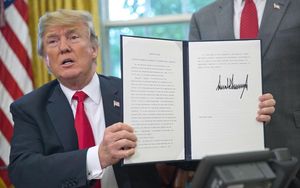The Trump administration has officially enacted tariffs on imports from Canada, Mexico, and China, marking the beginning of significant trade tensions across North America and Asia. With immediate effect, the U.S. has imposed tariffs of 10% on all goods from China and 25% on imports from its neighboring countries, Canada and Mexico. The president's decision reflects his administration's continuing strategy to address perceived economic unfairness and issues surrounding illegal immigration and drug trafficking.
On February 2, 2025, President Donald Trump signed the orders implementing these tariffs, prompting swift backlash from the affected nations. Canadian Prime Minister Justin Trudeau responded by announcing his government would retaliate with tariffs of 25% on U.S. goods, applicable to imports valued at approximately $155 billion. Trudeau emphasized during his address, "These tariffs will raise your cost of living, including for food and gasoline," indicating the potential financial strain on American consumers.
Mexico's President Claudia Sheinbaum also voiced her intent to defend Mexican interests, indicating plans for reciprocation against U.S. penalties. "We will act quickly and strongly for our country," she stated, articulately rejecting allegations from the U.S. administration linking Mexico to drug trafficking. Sheinbaum’s government has not provided specific details on their countermeasures, but the urgency is clear as both economic and diplomatic relations hang delicately by a thread.
China's government reacted with alarm, denouncing the tariffs as unjust and announcing plans to take action through the World Trade Organization (WTO). The Chinese Commerce Ministry criticized the tariffs, stating, "Fentanyl is America’s problem," asserting their commitment to combat drug trafficking rather than being made the scapegoat for U.S. domestic issues. Further, China plans to implement countermeasures, though specifics remain undisclosed.
The tariffs themselves are rooted deeply in Trump's continued assertion of America’s trade deficits and the need to create equilibrium between the nations' economic dealings. Trump has long expressed grievances against what he terms as unfair treatment by Canada and Mexico, stating, "We’ve been treated very unfairly by Canada." This perspective legitimizes his strategy to use tariffs as punitive measures to compel foreign governments to alter their practices and policies.
Experts project extensive economic fallout stemming from these tariffs on all involved countries. Economists warn the U.S. tariffs could exacerbate inflation, negatively impacting employment rates, especially where import reliance is high. The situation poses alarming risks not only for the targeted nations but also for international businesses operating within these regions. Mexican and Canadian exports are particularly vulnerable, with estimates indicating they may suffer economic downturns as high as 3.6% of their GDP.
For U.S. car manufacturers, the situation is particularly precarious. Many depend on components manufactured south of the border due to Mexico's lower labor costs. Countries such as Germany, reliant on Mexican production for exports to the U.S., could face additional challenges as well. Notably, automakers like Volkswagen, which manufacture extensively within Mexico, are expected to reevaluate operational strategies to mitigate cost impacts resulting from the escalated tariffs.
Trump’s recent actions evoke memories of previous trade squabbles, signaling the potential for all-out trade wars reminiscent of his earlier presidency. With the EU also being eyed for potential additional tariffs, globalization feels increasingly threatened, echoing sentiments of both unease and vituperation across the negotiating tables of the world.
The international community closely monitors the developments, awaiting the next moves from affected nations. Countermeasures are expected to vary, as firms and governments strategize how to navigate the challenging trade waters. The stakes are high, as each retaliatory action could perpetuate more extensive trade conflicts, resulting in adverse effects on global supply chains.
What does the future hold? Further escalation seems inevitable if the involved parties do not seek meaningful dialogue and compromise. The stakes are high for not only the respective economies but for global markets dependent on stability and cooperation among these heavyweight players.



